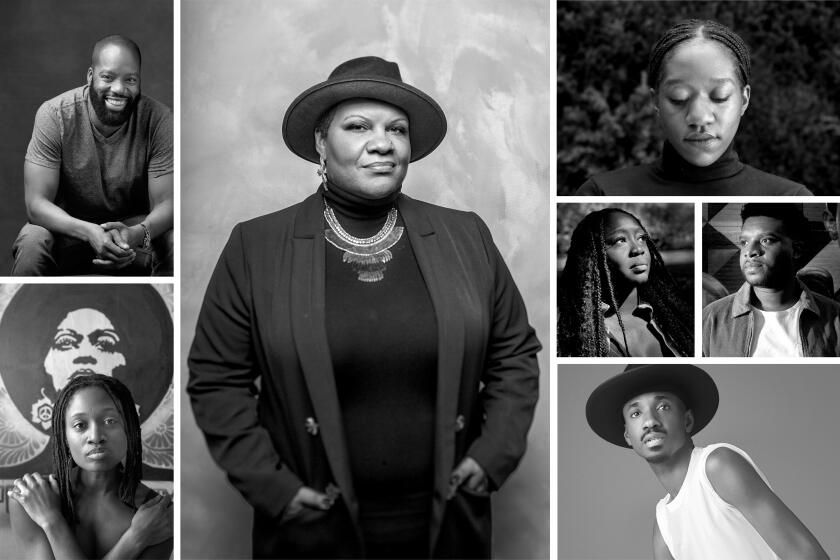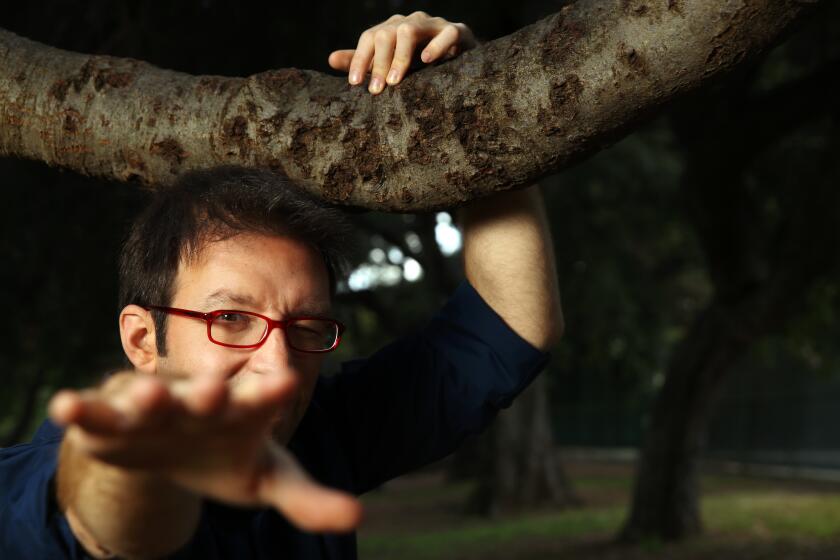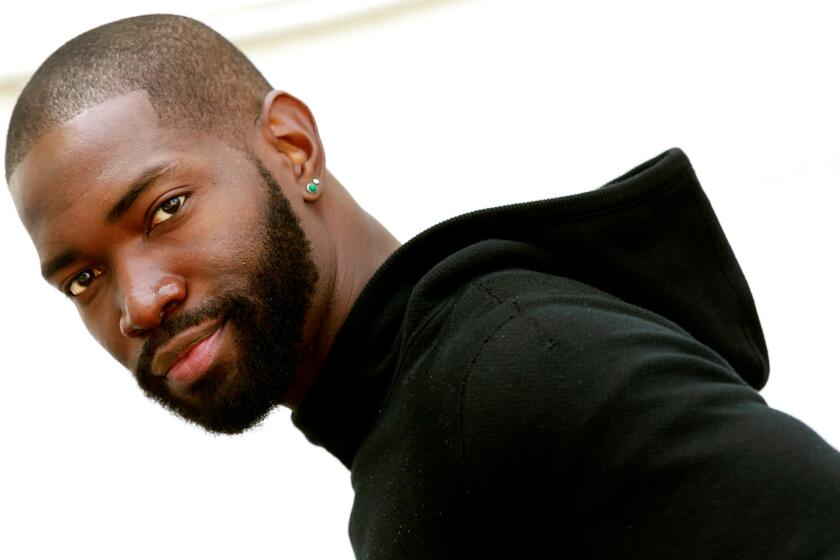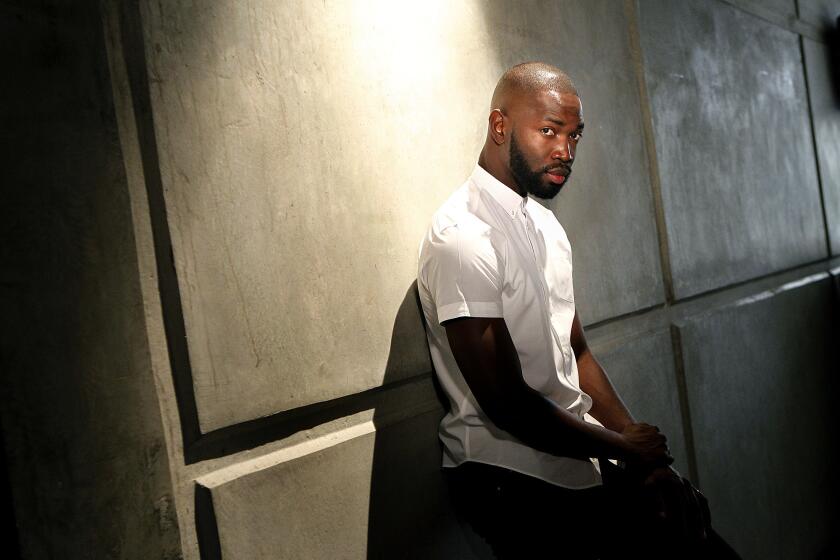Playwright and ‘Moonlight’ screenwriter Tarell Alvin McCraney to lead Geffen Playhouse
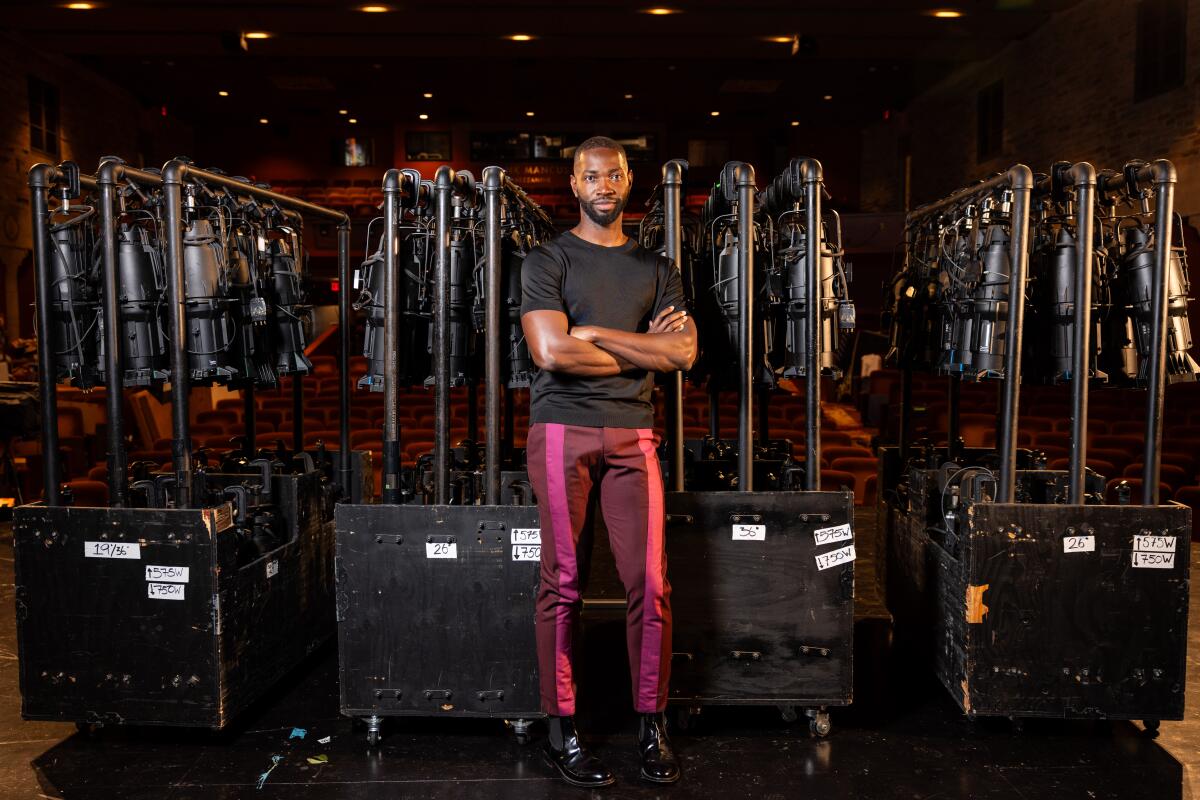
- Share via
Playwright and Academy Award-winning screenwriter Tarell Alvin McCraney has been named artistic director of the Geffen Playhouse. The appointment, which is effective immediately, places one of the most accomplished dramatists of his generation at the helm of the city’s most prominent Westside theater.
McCraney is best known for the Oscar-winning film “Moonlight,” which was adapted from his drama “In Moonlight Black Boys Look Blue.” His hire represents the second major appointment of an artistic director of color in Los Angeles in recent months, following the announcement in April of Snehal Desai as the new leader of Center Theatre Group.
Tarell Alvin McCraney, Geffen Playhouse’s new artistic director, discusses the “calling” of theater and his vision for the future of the Westside theater.
Filling the Geffen Playhouse’s top artistic job with a 42-year-old Black queer playwright is part of the epochal shift that has gained momentum in the American theater since the murder of George Floyd prompted a national reckoning on race. Theater companies have been taking a closer look at long-standing biases that have limited the range of their artistic programming and curtailed diversity in their executive ranks.
“There’s something happening right now where the folks who are leading the institutions are friends and colleagues, people I look up to,” McCraney said in an interview at the Geffen Playhouse, naming Desai and former Baltimore Center Stage artistic director Stephanie Ybarra, both of whom were his classmates at the Yale School of Drama. “It just felt selfish, sitting on the sidelines. I felt like you need to get in there to make a difference.”
Radha Blank’s ‘Forty-Year-Old Version’ on Netflix highlights racism in the theater industry. We asked 40 Black theatermakers for their stories.
McCraney has long made a difference in American theater, said friend and collaborator Oskar Eustis, artistic director of New York’s Public Theater. Eustis met McCraney after seeing his play “The Brothers Size” when McCraney was still a student at Yale School of Drama.
“It was just beautiful,” recalled Eustis. “We did something we’ve never done before or since. It was his thesis production, and we just picked up the entire production and brought it to the Public.”
“The Brothers Size” was part of autobiographically resonant trilogy “The Brother/Sister Plays,” co-produced by the McCarter Theatre and New York Public Theater in 2009, and marked McCraney’s entrance into the theater scene. Since then, said Eustis, McCraney has been a force of nature, making a name for himself not only as a playwright but as a screenwriter, actor, director and teacher.
His appointment comes at an inflection point for American theater, when organizations across the country are facing extreme financial, cultural and political headwinds, and leaders are struggling to find ways to build and maintain robust audiences and theatergoing communities.
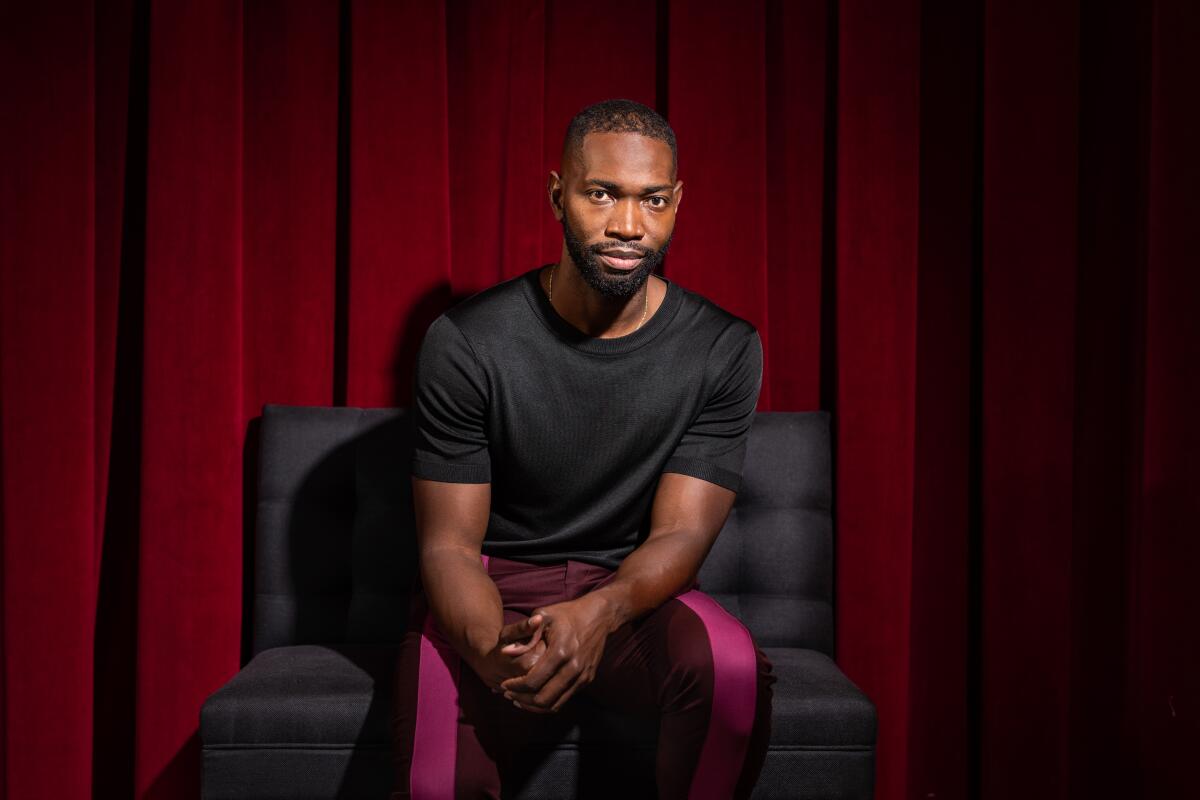
McCraney is fully cognizant of the multiple crises he will be asked to manage. The news of late has gone from bad to worse, with the temporary suspension of programming at the Mark Taper Forum, theater closures throughout the nation and widespread layoffs affecting even such premier venues as the Public Theater and Chicago’s Steppenwolf Theatre Company, where McCraney is an ensemble member.
The Geffen Playhouse hasn’t been impervious to the financial shocks that have battered the field — a combination of declining post-pandemic attendance, rising costs and the withdrawal of emergency government funding. But according to Gil Cates Jr., the Geffen’s executive director and chief executive, the theater has been able to weather the storm nonetheless. A consensus has arisen that the nonprofit theater business model is broken, but McCraney isn’t walking into an emergency situation — a rare luxury for a newly appointed artistic director.
“This is a very tough time,” Cates Jr. said in a conversation in the courtyard of the Geffen Playhouse, which was founded by his father, Gil Cates, in 1994. “I don’t take anything for granted. Looking around you see how you could get to a place with show cancellations and staff layoffs real quick. But we’re in a healthy place at the moment in large part because of the choices we made.”
The board of directors, Cates Jr. said, has encouraged an atmosphere of “healthy risk.” And that artistic investment has apparently paid off. The Geffen Stayhouse, the digital theater initiative that flourished during the COVID-19 pandemic, maintained a vital connection with existing audiences during the period of closure while expanding visibility for the Playhouse far beyond its usual radius.
Helder Guimarães’ show “The Present” has sold out through mid-August. How he and a small team pull off the watch-from-home show and why it all works.
Last season’s production of “The Inheritance,” the two-part Tony-winning gay epic drama by Matthew López, was one of the largest undertakings in Geffen Playhouse history — a sign that the theater was not allowing industry headwinds to deter its ambition. Audiences have appreciated the boldness. Cates Jr. said the Playhouse was already on the verge of meeting its subscription goal for the new fiscal year that began Sept. 1. He attributed this success to the investment in artistic programming made last season.
McCraney’s experience with Hollywood makes him uniquely poised to helm an L.A.-based institution, allowing him to tap into the riches of both the theater and the screen. “Moonlight” was directed by Barry Jenkins and earned Jenkins and McCraney an Oscar for Best Adapted Screenplay. While not strictly autobiographical, the film reflects aspects of the playwright’s own story.
Like Chiron in “Moonlight,” McCraney grew up in the rough and tumble of Miami’s Liberty City neighborhood, a queer Black youth struggling to survive with his dignity intact. His mother suffered from addiction and died from AIDS-related complications when McCraney was 22.
The arts were more than recreation to him as a young man — they were his salvation. He attended New World School of the Arts in Miami and found an early mentor in Teo Castellanos, who directed an improv troupe that McCraney joined as a teen. Castellanos later welcomed him into D-Projects, a contemporary dance and theater company that looks at social issues through the lens of intercultural performance. McCraney remains a member of the company.
A graduate of the Theater School at DePaul University and the Yale School of Drama, where he received his M.F.A. in playwriting, McCraney has made teaching an integral part of his artistic life. He stepped down as co-chair of Yale’s playwriting program but maintains his title of Eugene O’Neill Professor in the Practice of Playwriting at what is now called the David Geffen School of Drama at Yale University.
James Bundy, dean of the David Geffen School of Drama and artistic director of Yale Repertory Theatre, praised McCraney by email: “Tarell is a world-class artist and a most inspiring collaborator. Having known him as a student, a field leader, and colleague, I have long recognized him as an exemplar of everything that is both wonderful and promising about the American theater. Like so many great writers, he is a deep listener and brilliant speaker. He is also a courageous and compassionate visionary, who will change Los Angeles artists and audiences just as he has changed so many of us who have been fortunate enough to know him and his work well. Lucky L.A.!”
McCraney, whom Eustis described as “one of the most important, talented and ambitious theater makers of the last 50 years,” initially captivated the theater world with the free-form lyricism and raw courage of “The Brother/Sister Plays.” His play “Choir Boy,” the story of a gifted queer Black youth finding his voice in a bullying prep-school environment, was produced at the Geffen Playhouse in 2014.
For Tarell Alvin McCraney, watching “Moonlight” isn’t the wonderfully transformative experience it is for film critics shouting its praises from the rafters.
His association with the Playhouse continued with the announcement in February 2020 that a residency would be established for Cast Iron Entertainment, a cohort of artists that includes McCraney, Emmy winner Sterling K. Brown (“This Is Us”), Glenn Davis (“Billions”), Brian Tyree Henry (“Atlanta”), Jon Michael Hill (“Widows”) and André Holland (“Moonlight”). Plans were waylaid by the pandemic, but McCraney is intent on fulfilling the promise of this Geffen Playhouse-Cast Iron Entertainment union.
Miami is still McCraney’s spiritual home. He is looking for a place to live in Los Angeles, a city he knows well from his work as a screenwriter, and is expected to be full-time at the Geffen Playhouse by Dec. 1.
The creator of the coming-of-age TV drama series “David Makes Man,” McCraney calls himself a theater artist first, but one who enjoys extending his imagination into film and television. He was attracted to the Geffen Playhouse in part because of the unique place it occupies in Los Angeles’ cultural landscape.
Gil Cates, who died in 2011, founded the Geffen Playhouse in the backyard of the entertainment industry. A Hollywood macher who long served as a producer of the Academy Awards broadcast, he wanted the theater to be a place where movie and television artists with stage backgrounds could work alongside dedicated theater professionals. And this mission has been carried forward by his successors.
McCraney hopes to make this nexus available to a new generation of artists who feel a deep affinity for the stage and would like to be able to commute regularly between mediums in their hometown. He wants Los Angeles-based talent working in film and television not to feel as if they have to fly to New York to do a play or musical.
Saddened by the talent drain in his own town, he reflected, “I wish someone had said, ‘Hey, Miami artists, come home and do this work.’ Folks born and raised in L.A. shouldn’t have to go elsewhere to be theater artists.”
Tarell Alvin McCraney, one of the brightest American playwrights to come along in some time, showed up for our interview at the Geffen Playhouse with the buttoned-up demeanor of someone about to give testimony before a grand jury.
McCraney’s application was both surprising and alluring. Directors and creative producers, more than playwrights, are the go-to candidates for these positions. The reason for this isn’t rooted in ability so much as sensibility. Artistic director is to a large extent a management job. Writers can manage as well as anyone, but directors have experience running the show.
“This is a moment to be bold, inventive, to take risks, to have vision — and Tarell has all of that,” Cates Jr. said. “And it’s not like he’s coming in just looking for an artistic director job. This was the only artistic director job he applied for. That intrigued me.”
Matt Shakman, the Geffen Playhouse’s last artistic director, who succeeded Randall Arney in the role, had a burgeoning film career that inevitably divided his attention. Being an artistic director is an all-consuming responsibility, even more so in these straitened times. Signs of strain were apparent at the Geffen Playhouse in 2021 when playwright Dominique Morisseau pulled her play “Paradise Blue” a week after its West Coast premiere, stating that the Geffen had failed to act after learning of a situation in which Black women artists were being verbally abused and diminished.”
“The more hands-on a person can be in this job, the better it is for the theater,” Cates Jr. acknowledged. “Tarell knows that this isn’t a part-time gig at the Geffen. He’s committed to being here, to being in Los Angeles. He’s in tune with what the Geffen Playhouse needs and what the American theater needs.”
This passion to serve the American theater as it moves uncertainly through this difficult post-pandemic period while striving to fulfill its democratic promise has clearly inspired McCraney to redirect his focus.
“Democracy exists not so that we all feel the same about something but so that we can feel differently about something but choose to live together anyway,” he said. “I always thought that the theater should do that.”
More to Read
The biggest entertainment stories
Get our big stories about Hollywood, film, television, music, arts, culture and more right in your inbox as soon as they publish.
You may occasionally receive promotional content from the Los Angeles Times.

